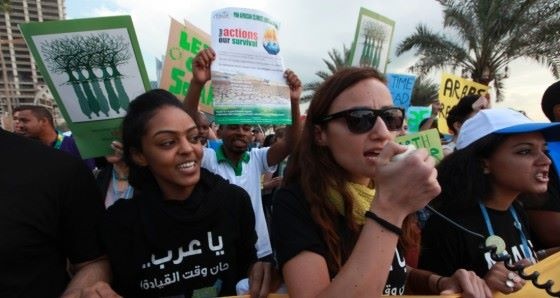Fourteen youths shortlisted for the Arab youth “Green Voices” challenge participated in the second policy lab discussing “Climate Activism in the MENA Region”. Held by the Arab Renaissance for Democracy and Development (ARDD), in partnership with RNW Media, the event, which is part of the Green Voices Project, funded by the Embassy of the Netherlands, hosted California-based Rusul Al Shihab, the Middle East and North Africa Director for Earth Day 2020 organization, and Wael Hmaidan, a global environment activist and advocate, and founder of IndyACT, a global non-political league of independent environmental, social and cultural advocates.
According to Myriam Marcuello Lopez, ARDD senior advisor who moderated the discussion, “young activists are at the forefront of the struggle on climate change. Although it is less visible and faces many challenges, the climate movement in the MENA region is also vibrant, creative and determined. Today’s session is a great opportunity for our youth to connect and learn from seasoned climate activists.”
Hmaidan addressed the issues raised by the young participants with regard to climate activism, stressing that although the word “activist” has become loaded with negative connotations in some countries or by some people, it is still a positive term because it means “someone who is being active to make a difference”, adding that “we shall not shy away from being active on matters that are crucial to the common good.”He also highlighted the important role of social media in making visible the initiatives of activists, and talked about the challenge of making one’s voice heard, “due to algorithms controlling what people view, according to their interests”. This problem, however, “can be overcome by linking climate issues with other topics of interest to the people, to increase their awareness and capture more viewership online”, he suggested.
Shihab said that the COP27 summit, which will be held in Egypt in November and in the United Arab Emirates next year, “presents a golden opportunity for these countries to lead the environmental movement in the Arab world”. The meetings also offer a space to engage with various stakeholders, including civil society, environment activists, and business enterprises, he said, expressing hope that COP27 will offer tangible solutions and action plans. Shihab urged Arab governments to seek collaboration with Arab civil society organizations and said that climate activists should cooperate with their governments, as the “true role of advocacy and activism is to build dialogue, ties, and bridges with policymakers”. Activists, he underlined, are the main link between citizens and local governments.
A participant in the discussions complained about the lack of legislation linking climate action to human rights in his country. Hmaidan agreed that new laws pertaining to the issue should be enacted, noting, however, that the” climate conflict is an economic conflict in essence, which requires transforming how economies operate”.
He used Lebanon as an example of a country that suffered a huge economic collapse that can only be saved through resorting to a green economy strategy.
He further advised the participants to constantly learn and enrich their knowledge in the matter until they become “experts” and may be considered ascredible advocates and reliable sources of information and knowledge.
A participant from Yemen was interested to learn how he can attract people to join environment advocacy and call for action campaigns. Hmaidan stressed that each situation is unique, therefore “it is important to be able to evaluate the country’s priorities and identify what activists and civil society organizations are doing, their capacity for action, main experiences and their networks and ties”. Networking with other advocates and creating joint activities is crucial for success, he said.
Shihab advised participants to stay positive and be persistent and think like businesspeople in their lobbying efforts. For example, he explained, to introduce education about the environment in schools, or for any lobbying effort, “there must be a value proposition or an advantage that the interlocutors will gain”, adding that this could be done by introducing certain changes requested. He reminded participants that they are change makers, and as young people, they are a power that governments are aware of. Many renowned organizations started as youth or student movements; he reminded the audience.
This policy lab is the second in a series of similar events and activities aimed at offering Arab youths a space for debate, learning, knowledge sharing, capacity building, and enhancing their advocacy efforts. Ten young finalists will participate in the COP27 summit, to be held next month in Sharm El Sheikh, Egypt. The policy labs aim to prepare them to engage in a wider dialogue with regional and global civil society movements, environmentalists, government representatives, and all other stakeholders relevant to their work.


